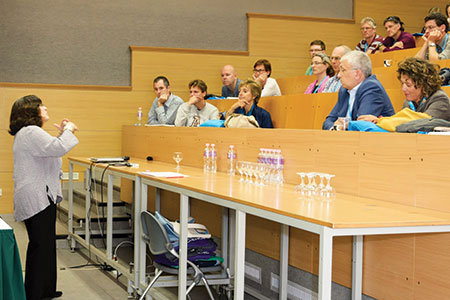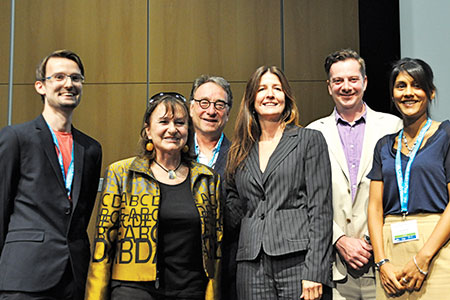Integrative Science Featured at European Conferences
Annual Meeting of the European Society for Cognitive Psychology
The 18th Annual Meeting of the European Society for Cognitive Psychology (ESCoP) was held August 29–September 1 in Budapest. The meeting featured a joint APS/ESCoP preconference symposium, “Building a Better Psychological Science: Good Data Practices and Replicability.” Leading experts discussed the causes and extent of bias and error problems in science as well as potential solutions to these and other complex problems affecting replicability. Speakers included APS Fellow Brian Nosek, University of Virginia and the Center for Open Science; Barbara Spellman, University of Virginia, Editor, Perspectives on Psychological Science; Eric-Jan Wagenmakers, University of Amsterdam; APS Fellow Axel Cleeremans, Université Libre de Bruxelles; and APS Fellow Hal Pashler, University of California, San Diego.

Barbara A. Spellman, Editor of the APS Journal Perspectives on Psychological Science, engages attendees in a discussion on good data practices and replicability during a presentation at the 18th Annual Meeting of ESCoP.
European Conference on Developmental Psychology
APS and the European Association for Developmental Psychology co-sponsored an integrative science symposium at the XVIth European Conference on Development Psychology held September 3–7 in Lausanne, Switzerland. The session included four talks on the genetic and environmental vulnerabilities that influence gene expression as well as neural, cognitive, and behavioral developmental trajectories. APS Board Member Annette Karmiloff-Smith, Birkbeck, University of London, chaired the symposium, and presenters included Michael Thomas and Esha Massand, also of Birkbeck, University of London; BJ Casey, Weill Cornell Medical College; and Przemek Tomalski, University of Warsaw.

Participants at the XVIth European Conference on Developmental Psychology included Przemek Tomalski, University of Warsaw; APS Board member Annette Karmiloff-Smith, Birkbeck, University of London; APS Executive Director Alan G. Kraut; BJ Casey, Weill Cornell Medical College; Michael Thomas, Birkbeck, University of London; and Esha Massand, Birkbeck, University of London.





APS regularly opens certain online articles for discussion on our website. Effective February 2021, you must be a logged-in APS member to post comments. By posting a comment, you agree to our Community Guidelines and the display of your profile information, including your name and affiliation. Any opinions, findings, conclusions, or recommendations present in article comments are those of the writers and do not necessarily reflect the views of APS or the article’s author. For more information, please see our Community Guidelines.
Please login with your APS account to comment.